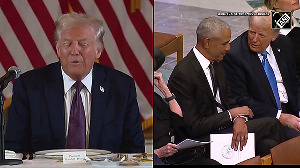Nothing has exposed the grave failure of India's recent policy towards its immediate neighbourhood as thoroughly as New Delhi's support for Burma's military dictatorship -- just when the hated junta was confronted with the greatest pro-democracy upsurge since 1988.
Thanks to this support, backed by lethal arms supplies, India has become complicit in the ruthless repression of the popular movement, which killed up to 200 people and led to the detention of 6,000. The repression hasn't ended. Opposition leader Win Shwe reportedly died due to torture by the ruling State Peace and Development Council.
India has reluctantly, unconvincingly, revised its stand under international and domestic pressure, but this hasn't salvaged its credibility. Last week, India voted at the United Nations Human Rights Council for a resolution calling for the release of incarcerated National League for Democracy leader Aung San Suu Kyi, and condemning the 'violent repression' of demonstrations, 'including thorough beatings, killings, arbitrary detentions and enforced disappearances.' The motion called for a 'reinvigorated national dialogue with all parties with a view to achieving genuine national reconciliation, democratisation and the... rule of law.'
India voted for the motion, but only after regretting that its text isn't 'fully in conformity' with its own 'forward-looking, non-condemnatory' approach. India's 'explanation of vote' said the resolution's tone won't contribute to 'engaging constructively' with the Burmese authorities. India's kid-glove approach to the junta sits ill with the latter's grave human rights violations, against which the world community is duty-bound to protect the Burmese people.
India wants the Burmese regime to conduct an investigation into the violence which saw soldiers raining bullets and tear-gas shells upon peaceful demonstrators. What this investigation will achieve is unclear. The violence was clearly state-ordered and -- executed.
Yet, India opposes economic sanctions or other tough measures against the Burmese regime. Foreign Minister Pranab Mukherjee said in New York: "We should instead try to engage [them] in negotiations... Sanctions... [can]... end in the suffering of innocent people." Blanket sanctions can be ineffectual. But 'engagement' has proved futile in Burma. This was again confirmed on September 23-24 when Petroleum Minister Murli Deora accepted an invitation to visit Burma to sign a $150 million gas deal -- just when state repression was peaking.
"This sent a terrible message," said Soe Myint, a Burmese pro-democracy activist exiled in India, and editor of the Mizzima news agency (www.mizzima.com). "The message was that democratic India wouldn't lift its little finger to restrain the Burmese regime. Instead, India would tail the generals as they butchered innocents. We were greatly disappointed."
Mukherjee has again given a clean chit to the junta. On October 7, in Guwahati, he pledged India's commitment to Burma-specific projects "in diverse fields such as roads, railways, telecommunications, information technology... and power" --- as part of the so-called 'Look East' policy, itself linked to 'a strategic shift' in India's world vision.
Ironically, he was only reading out excerpts from an earlier speech he made in Shillong in June! So much for the attention India pays to 'Look East!' Now, India is about to reward Burma with a $100 million transportation project (Kaladan), which will give it overland access to Sittve port.
India's ultra-conservative Burma position derives from four considerations: eagerness to enlist Burma's help in fighting insurgencies in the Northeast; interest in Burma's natural gas; anxiety to counter China's regional influence; and concern for 'stability' in the neighbourhood.
It's shameful that India's Burma policy should be determined by such narrow, parochial factors. This involves jettisoning universal principles and doctrines, including democracy and human rights, which India loudly stresses in the Western-sponsored Concert of Democracies. This speaks of double standards. 'Look East' also means turning a blind eye to dictatorship.
Yet, Burma isn't just another country. It is India's land bridge to Southeast Asia. Until 70 years ago, it was part of India, and bound to it through close cultural, economic and political ties. Without 'Burma Teak,' Asia's best-known hardwood, many of our historical buildings might never have been built. Burmese rice was as important in our kitchens as is Afghanistan's heeng.
Rangoon, now Yangon, was as Indian/subcontinental in ethnic composition and character as Bombay, Madras or Karachi. Many eminent Indians -- BG Verghese and Prakash Karat, to name two -- were born in Rangoon. Not long ago, we had a Burmese-origin First Lady (Usha Narayanan). India's South, East and Northeast all have major 'Burma connections.'
Like India, Burma is a multi-ethnic, multi-lingual, multi-religious society. The two share a great modern legacy as well -- the Freedom Movement. Aung Sang, Suu Kyi's father, who led Burma's anti-colonial struggle, was inspired by Gandhi and Nehru. Suu Kyi studied here and regards India as her second home, with which she has a deep, abiding relationship.
The SPDC stands for the destruction of all these bonds. It represents the dominant ethnic group (Burman) and excludes 17 others. This predatory and super-corrupt regime has brutalised 50 million people with a huge 490,000-strong army. (This is like having an Indian army 10 times its present size!) It consumes a third of Burma's budget -- 10 times the allocation to education.
The military is selling Burma's magnificent resources cheap and perpetuating the poverty of three-fourths of its people. It routinely practises forced conscription, slave labour and torture. Its censorship is so drastic that anyone with an 'unauthorised' fax machine or computer is jailed for 7 to 15 years. The SPDC conducts extra-judicial executions, 'disappears' dissidents, and recruits child soldiers. It stands accused of arbitrary detention and violating freedoms of belief and religion, and of association and assembly. Regime-sponsored or tolerated drug smuggling and gun-running are Burma's biggest businesses.
India's Burma approach was spelt out in a crudely forthright manner by the new army chief, Gen Deepak Kapoor. He said the state violence is Burma's "internal affair", and "we should maintain" our "good relations" with its government. This policy statement is an intrusion into the executive's prerogative. Yet, it captures the essence of the government's 'realism'-driven stand, which hypocritically professes 'non-intervention' when that suits it, while practising the opposite when it can. In fact, serious rights violations anywhere are everybody's concern.
Ironically, India's policy has yielded none of the desired results. Burma has been ineffectual in preventing Northeastern insurgents from establishing camps on its soil. It has only restrained the National Socialist Council of Nagaland (Khaplang), with which it has a ceasefire agreement. It has taken token or desultory action against other groups. Burma has played China off against India, while milking both for assistance. India has walked into this trap.
India's famed 'interests' in Burmese gas have produced international embarrassment. Four Indian companies figure among the 'Dirty 20' implicated in terrible human rights violations and environmental destruction, detailed by EarthRights International and other groups.
However, India has received no gas or gas supply contracts from Burma. Just recently, Burma awarded two gas blocks off the Arakan coast to China. Originally, two Indian public-sector companies had a 30 percent stake in these. India does have other gas sources. Besides, Burma's gas delivery will crucially depend on transit through Bangladesh. Bangladesh isn't cooperating.
It's specious to argue that India should befriend Burma's regime to contain China. Those who demand that India must act as a countervailing force to China advocate a new Asian Cold War -- with disastrous consequences for India's long-term security. An arms race with China -- that too with a nuclear component -- will sharply raise India's already bloated military expenditure.
Finally, 'stability,' defined independently of legitimacy, is a recipe for freezing existing iniquities. India's long-term interests don't lie in a neighbourhood with 'stable' but tyrannical regimes.
India's major political parties, including the Congress, the Communists, and even the Bharatiya Janata Party, have demanded a change in its Burma policy. So have civil society groups. Particularly significant here are Northeastern groups whose ethnic identities cut across the Burma border.
Their pressure can bring Indian policy more in line with the position of the early 1990s, when India advocated a dialogue with Ms Suu Kyi, who had won the 1990 election with a thumping majority, and awarded to her the 1993 Nehru Prize for International Understanding. India made a strong political point -- without severing its relations with the Burmese government. But it soon shamefully reversed its stand.
There's a lesson in this: India can stand its ground if it wants to. In the 1960s, it did so on Vietnam despite its 'ship-to-mouth' dependence on the US for food. Later, India backed the African National Congress in the face of Western pressure. The ANC eventually triumphed.
India can and should follow a broad-horizon policy based on a universal international vision, which gives it many options in the neighbourhood too. Ironically, India's vision is shrinking just when its global profile has risen, opening up new opportunities to engage with the world. This isn't a sign of a confident rising power with an independent foreign policy.






 © 2025
© 2025